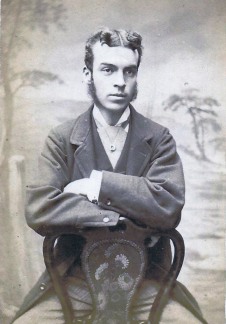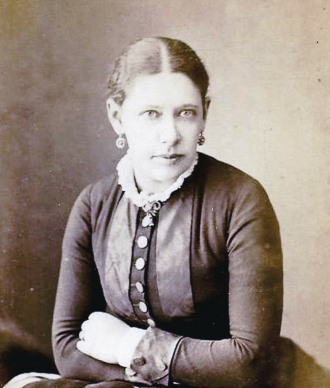
 |
Walter
Thomas Gillett Burr was born in Fordcombe in Kent in 1850. By 1861 he had moved to
Bethnal Green where
became a pupil teacher for five years at St Bartholomew’s School before
leaving
to attend Cheltenham Teachers Training College.
The college was founded in 1847 for the purpose of
training Masters for
Elementary Schools in connection with the Church of England.
Having
spent one year there and acquired his qualification to act as an
Elementary
School Teacher, Walter arrived for his first teaching job in Ruyton XI
Towns in
1872. He was
accompanied by another
graduate of the Collage, Miss Martha Lewis who had also been a teacher
at
Dudley. She was to be in charge of the Girls School at a salary of £22.
Per annum.
and, at 22, the School Master`s salary was £40 with use of the School
House, an
Assistant Teacher`s salary was £16.
There
would have been around 200 pupils in the school, aged between 5 and 10
years
old. The leaving age of 14 was not made compulsory until 1918, with the
school
day starting at 7a.m. and finishing at around 5.p.m.
In 1870 the Forster Education act was passed
whereby children between 5 and 10 and living within 2 miles of a school
were
forced to attend by an Act of Parliament passed in 1876. School was not
free
for most pupils until 1891 and the school running costs were met by
pupils`
fees as much as possible, this amounted to £35 pa in the 1870’s+ local
subscriptions of around £50 and a Government Grant of £90 Total of £175. Pupils were expected to
pay a 1 penny a week
which was a lot of money for a large family to find, consequentially,
many
children were kept at home or worked elsewhere picking damsons or
bilberries or
even picking stones and gleaning from the fields, all of which would
have
augmented the family meagre incomes.
Summer holidays were arranged with the Vicar and local
farmers so that
pupils would be available to help in the fields.
Mr
Burr found much work was needed to bring the School up to the new
standard.
There were hardly any inkwells, no timetables and very few basic books. He
had many and varied interests which he introduced to the School His
love of
music involved him with the Church choir as Choir Master and organist,
he was a
bell ringer of the main church bells as well as hand bell ringing. As a keen organist, he was
instrumental in
arranging for the old organ to be moved from the Church into the main
school
room. A keen
sportsman, he set up
cricket and football teams as well as playing tennis and quoits.
In
1874 he also installed a gymnasium in the new room at the school, with
parallel
and horizontal bars, the gym was to encourage the pupils to keep fit
and to get
rid of their excess energy. As
well as
operating the Penny Bank and Savings Club, he ran the Penny Reading
Library and
other evening classes as well as organising Temperance Meetings and
being
Secretary of the Foresters Club (a British Friendly
Society a mutual organization
caring for
the sick. History
was another major interest and he was
a member of the Oswestry Archaelogical Field Club and assisted in the
survey of
Ruyton Castle which took place in 1878.
He
married in Ruyton in 1875, his bride, Miss Sarah Ford eldest daughter
of Thomas
and Elizabeth Ford of Bay Tree Cottage, Little Ness Road, Thomas being
the
local Excise Officer. Sarah had been a Nurse in London, but on her
marriage,
she was taken on a Sewing Mistress at the School. The family lived in
the
School House. The
couple went on to
have 5 sons and one daughter, with one of their sons dying in 1916 as a
result
of illness brought on by his war service.
In
1883, after 11 years, Walter left for pastures new. The people of the
village
presented him with a clock, as a reminder of his time with the school.
His
new post was as Head of the Soresby Street Boys School at Taplow,
Chesterfield
and then the next year he went on to be Head of Holy Trinity,
Brimington in Chesterfield.
He stayed in this post until 1916, one year after his promised
retirement date
of 1915 when he would have been 65.
While in Chesterfield he was a prominent member of the local Council and in 1907 also stood as an Independent Candidate for the Rural Council. He continued with his music and his archaeological pursuits and was instrumental in setting up the Derbyshire Field Club. He was said to be a pioneer of Technical Education in Chesterfield and introduced many Science programmes in the area.
Walter
died in 1930 age 80 and his wife Sarah in 1939 age 90.
Both are buried in the family grave at
Brimington, Derbyshire.
 |
 |
|
| Waltter T. G. Burr | Mrs. Sarah Burr |